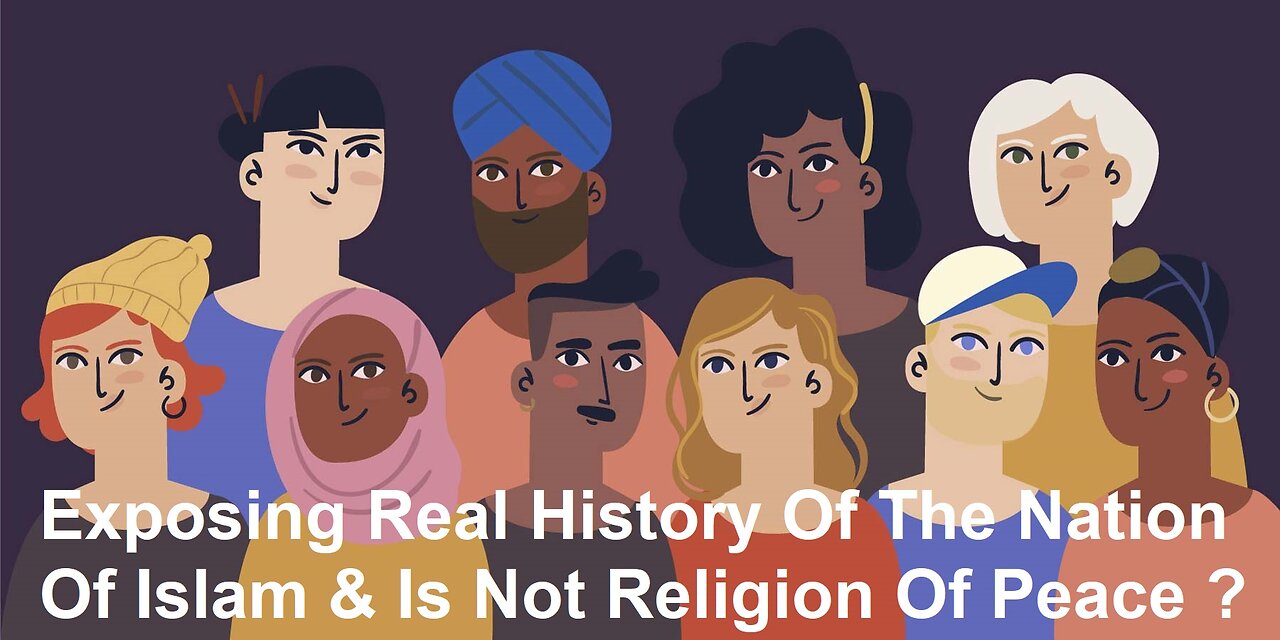Premium Only Content

Exposing Real History Of The Nation Of Islam & Is Not Religion Of Peace And Justice
This is the origins and true history of the NOI, which includes interviews, clips, and historical evidence about major figures in the Black Muslim movement. Some of the things/people mentioned is Noble Drew Ali, Wallace Fard Muhammad, Elijah Muhammad, Malcolm X, Louis (X) Farrakhan, Clarence 13X, Warith Deen Mohammed, Khalid Abdul Muhammad, and most important what the Netfix Documentary "Who Killed Malcolm X?" did NOT tell you about the Assassination of El-Hajj Malik El-Shabazz.
Is Mecca or Petra Islam’s true birthplace?
The theory seems to have some archeological evidence going for it. It seems that most of the early mosques did actually face Petra. It does seem that the opponents of Muhammad in the Quran have a more in common with Northern Arabia and the Levant than they do with the Hijaz. This evidence includes the tribes mentioned such as Ad, Thamud, and Midian. The reference to olive trees indicates that it’s further north as well. This is where the decent evidence stops.
Muslims don’t have any early Islamic sources for their religion. The only early sources of Islam are references by chroniclers, monks, and others. However, all of the late Muslim evidence points to Mecca. Now, Gibson and Smith simply say that they’ve been edited and redacted. There are a few things that might raise an eyebrow but I don’t know how one can make a wholesale redaction as complete as that. To be honest, they sound like Muslim apologists saying that the Bible has been edited and redacted when there is no evidence that it was.
Smith and Gibson need to examine how things go from Petra to Mecca so they say that there was an Earthquake in Petra in 713 AD and the black stone had to be moved from Petra to Mecca. I was curious about this so I sent an email to Pfander which is Jay Smith’s group.
The Nation of Islam (NOI) is an African American political and religious movement, founded in Detroit, Michigan, United States, by Wallace D. Fard Muhammad on July 4, 1930. Its stated goals are to improve the spiritual, mental, social, and economic condition of African Americans in the United States. Critics have described the theology of the organization as promoting black superiority over whites, antisemitism and anti-LGBT rhetoric. The Southern Poverty Law Center tracks the NOI as a hate group. Its official newspaper is The Final Call. In 2007, the core membership was estimated to be between 20,000 and 50,000. It is one of the wealthiest organizations in black America.
Fard disappeared in June 1934. His successor Elijah Muhammad established places of worship (called temples or mosques), a school named Muhammad University of Islam, farms, and real estate holdings in the United States and abroad. The Nation has long been a strong advocate of African-American businesses.
There were a number of splits and splinter groups during Elijah Muhammad's leadership, most notably the departure of senior leader Malcolm X to become a Sunni Muslim. After Elijah Muhammad's death in 1975, his son, Warith Deen Mohammed, changed the name of the organization to "World Community of Islam in the West" (and twice more after that), and attempted to convert it to a mainstream Sunni Muslim ideology.
In 1977, Louis Farrakhan rejected Warith Deen Mohammed's leadership and re-established the Nation of Islam on the original model. He took over the Nation of Islam's headquarters temple, Mosque Maryam (Mosque #2) in Chicago, Illinois. Since 2010, under Farrakhan, members have been strongly encouraged to study Dianetics, and the Nation claims it has trained 1,055 auditors.
World religions for world peace
"All the major religions of the world can contribute to world peace and work together for the benefit of humanity if we put aside subtle metaphysical differences." - The 14th Dalai Lama
The principles discussed so far are in accordance with the ethical teachings of all world religions. I maintain that every major religion of the world—Buddhism, Christianity, Confucianism, Hinduism, Islam, Jainism, Judaism, Sikhism, Taoism, Zoroastrianism—has similar ideals of love, the same goal of benefiting humanity through spiritual practice, and the same effect of making their followers into better human beings. All religions teach moral precepts for perfecting the functions of mind, body, and speech. All teach us not to lie or steal or take others’ lives, and so on. The common goal of all moral precepts laid down by the great teachers of humanity is unselfishness. The great teachers wanted to lead their followers away from the paths of negative deeds caused by ignorance and to introduce them to paths of goodness.
All religions agree upon the necessity to control the undisciplined mind that harbours selfishness and other roots of trouble, and each teaches a path leading to a spiritual state that is peaceful, disciplined, ethical, and wise. It is in this sense that I believe all religions have essentially the same message. Differences of dogma may be ascribed to differences of time and circumstance as well as cultural influences; indeed, there is no end to scholastic argument when we consider the purely metaphysical side of religion. However, it is much more beneficial to try to implement in daily life the shared precepts for goodness taught by all religions rather than to argue about minor differences in approach.
There are many different religions to bring comfort and happiness to humanity in much the same way as there are particular treatments for different diseases. For, all religions endeavour in their own way to help living beings avoid misery and gain happiness. And, although we can find causes for preferring certain interpretations of religious truths, there is much greater cause for unity, stemming from the human heart. Each religion works in its own way to lessen human suffering and contribute to world civilization. Conversion is not the point. For instance, I do not think of converting others to Buddhism or merely furthering the Buddhist cause. Rather, I try to think of how I, as a Buddhist, humanitarian can contribute to human happiness.
While pointing out the fundamental similarities between world religions, I do not advocate one particular religion at the expense of all others, nor do I seek a new ‘world religion’. All the different religions of the world are needed to enrich human experience and world civilisation. Our human minds, being of different calibre and disposition, need different approaches to peace and happiness. It is just like food. Certain people find Christianity more appealing, others prefer Buddhism because there is no creator in it and everything depends upon your own actions. We can make similar arguments for other religions as well. Thus, the point is clear: humanity needs all the world’s religions to suit the ways of life, diverse spiritual needs, and inherited national traditions of individual human beings.
Whether we will be able to achieve world peace or not, we have no choice but to work towards that goal.
It is from this perspective that I welcome efforts being made in various parts of the world for better understanding among religions. The need for this is particularly urgent now. If all religions make the betterment of humanity their main concern, then they can easily work together in harmony for world peace. Interfaith understanding will bring about the unity necessary for all religions to work together. However, although this is indeed an important step, we must remember that there are no quick or easy solutions. We cannot hide the doctrinal differences that exist among various faiths, nor can we hope to replace the existing religions by a new universal belief. Each religion has its own distinctive contributions to make, and each in its own way is suitable to a particular group of people as they understand life. The world needs them all.
There are two primary tasks facing religious practitioners who are concerned with world peace. First, we must promote better interfaith understanding so as to create a workable degree of unity among all religions. This may be achieved in part by respecting each other’s beliefs and by emphasising our common concern for human well-being. Second, we must bring about a viable consensus on basic spiritual values that touch every human heart and enhance general human happiness. This means we must emphasise the common denominator of all world religions—humanitarian ideals. These two steps will enable us to act both individually and together to create the necessary spiritual conditions for world peace.
We practitioners of different faiths can work together for world peace when we view different religions as essentially instruments to develop a good heart—love and respect for others, a true sense of community. The most important thing is to look at the purpose of religion and not at the details of theology or metaphysics, which can lead to mere intellectualism. I believe that all the major religions of the world can contribute to world peace and work together for the benefit of humanity if we put aside subtle metaphysical differences, which are really the internal business of each religion.
Despite the progressive secularisation brought about by worldwide modernisation and despite systematic attempts in some parts of the world to destroy spiritual values, the vast majority of humanity continues to believe in one religion or another. The undying faith in religion, evident even under irreligious political systems, clearly demonstrates the potency of religion as such. This spiritual energy and power can be purposefully used to bring about the spiritual conditions necessary for world peace. Religious leaders and humanitarians all over the world have a special role to play in this respect.
Whether we will be able to achieve world peace or not, we have no choice but to work towards that goal. If our minds are dominated by anger, we will lose the best part of human intelligence—wisdom, the ability to decide between right and wrong. Anger is one of the most serious problems facing the world today.
His Holiness the 14th Dalai Lama, Tenzin Gyatso is the spiritual leader of Tibet. Since taking asylum in India in 1959, His Holiness has become a global advocator of peace, compassion and happiness. He is the first Nobel Laureate to be recognized for his concern for global environmental problems.
Islam is a religion of peace in the fullest sense of the word. The Quran calls its way "…The ways of peace…" [Quran: 5:16] It describes reconciliation as the best policy [Quran: 4:128], and states that God abhors any disturbance of peace [Quran: 2:205]
The root word of Islam is 'Silm', which means peace. So the spirit of Islam is the spirit of peace. The first verse of the Quran breathes the spirit of peace; it reads: "In the name of God, the Most Merciful, the Most Compassionate."
This verse is repeated in the Quran no less than 114 times. It shows the great importance Islam attaches to such values as Mercy and Compassion. One of God's names, according to the Quran, is As-Salaam, which means Peace. Moreover, the Quran states that the Prophet Muhammad sallallaahu `alayhi wa sallam ( may Allah exalt his mention ) (may Allah exalt his mention) was sent to the world as a mercy to mankind. [Quran: 21:107]
A perusal of the Quran shows that most verses of the Quran (and also the Hadeeth) are based on peace and kindness, either directly or indirectly. The ideal society, according to the Quran is Dar As-Salaam, that is, the house of peace [Quran: 10:25]
The Quran presents the universe as a model, which is characterised by harmony and peace [Quran: 36:40] When God created heaven and earth, He so ordered things that each part might perform its function peacefully without clashing with any other. The Quran tells us that "It is not allowable [i.e., possible] for the sun to reach the moon, nor does the night overtake the day, but each, in an orbit, is swimming." [Quran: 36:40] For billions of years, therefore, the entire universe has been fulfilling its function in total harmony with His divine plan.
According to Islam, peace is not simply an absence of war. Peace opens doors to all kinds of opportunities which are present in any given situation. It is only in a peaceful situation that planned activities are possible. It is for this reason that the Quran says: "…And settlement is best…" [Quran: 4:128] Similarly, Prophet Muhammad sallallaahu `alayhi wa sallam ( may Allah exalt his mention ) has observed: "God grants to gentleness (Rifq) what He does not grant to violence ('Unf). [Abu Daawood]
According to Islam, peace is the rule and war is only an exception. Even in defensive war we have to analyse its result; if the result is doubtful, Muslims should avoid war. Stray acts of aggression are not enough for Muslims to rush into war. They have to assess the whole situation and adopt a policy of avoidance when war is not certain to achieve a positive result.
In actual fact, the mission of all the Prophets from Aadam (Adam) to 'Eesaa (Jesus), may Allah exalt their mention, was one and the same - of establishing the ideology of monotheism in the world, so that man might worship the One God alone. As we know, there came a large number of Prophets in ancient times but the message of monotheism remained at the initial stage; it could not culminate in revolution.
In ancient times, the system of monarchy was entrenched throughout the world. The kings, in order to secure their political interests, adopted the course of religious persecution. These kings suppressed all religious movements that were different from the state religion. They would nip all 'apostasy' in the bud since they saw religion as a matter of affirming one's loyalty to the state. If a person adhered to a religion other than the state religion, he was regarded as a rebel.
That is why in ancient times, prophetic movements could go no further than the state of Da'wah, or invitation to Islam. No sooner would a movement based on monotheism arise than the coercive political system would be activated to pull it out by its roots. The reason for the absence of any historical record of Prophets (besides the Prophet Muhammad sallallaahu `alayhi wa sallam ( may Allah exalt his mention )) in antiquity is traceable to the intense opposition of these coercive political systems.
All the Prophets of ancient times, historically speaking, were like mythical beings, rather than real human beings accepted as historical figures. Prophet 'Eesaa (Jesus), may Allah exalt his mention, was the last link in the chain of these persecutions faced by the preachers of monotheism. Then God decreed the abolition of this coercive political system, even if it entailed the use of force in order that the age of religious persecution might be brought to an end forever, and replaced by the age of religious freedom. This Divine plan was brought to completion through the Prophet Muhammad sallallaahu `alayhi wa sallam ( may Allah exalt his mention ) and his companions, may Allah be pleased with them all. This is the command given in the Quran: "Fight them until there be no fitnah [i.e., persecution] and [until] the religion [i.e., worship], all of it, is for Allah…" [Quran: 8:39]
Therefore, Prophet Muhammad sallallaahu `alayhi wa sallam ( may Allah exalt his mention ) received special divine succour in the form of a powerful team consisting of one hundred thousand individuals. Equipped with this team, the Prophet sallallaahu `alayhi wa sallam ( may Allah exalt his mention ) waged war to end this coercive system of religious persecution, and it was in Arabia that it was first of all overthrown. Then within a very short span of time, they advanced to abolish the coercive system established by the Sassanid and Byzantine empires.
In the wake of this Islamic action, the coercive system was abolished forever in the major part of the inhabited world of the time. This war waged by Prophet Muhammad sallallaahu `alayhi wa sallam ( may Allah exalt his mention ) and his companions was not a war as is commonly understood, but rather a divine operation, which was carried out by people who possessed a high standard of moral character.
However, this operation was certainly only temporary in nature. Its goal was to put an end to the age of religious persecution and usher in the age of religious freedom. This end was fully achieved during the early period of Islam, the age of the pious Caliphs. Afterwards the time came to keep the sword in its sheath and engage in Da'wah work, that is, the call to God, which was the real and permanent goal of Islam.
It is no exaggeration to say that Islam and violence are contradictory to each other. The concept of Islamic violence is so obviously unfounded that, prima facie it stands rejected. The fact that violence is not sustainable in the present world is enough to convince one that violence, as a principle, is quite alien to the scheme of things in Islam. Islam claims to be an eternal religion and such a religion cannot afford a principle in its scheme which will not be sustainable in later periods of human history. An attempt to bracket violence with Islam amounts to casting doubts upon the very eternity of the Islamic religion.
No wonder then that the Prophet Muhammad sallallaahu `alayhi wa sallam ( may Allah exalt his mention ) so earnestly used to entreat his Lord in his daily prayer: "O God, you are the original source of Peace; from You is all Peace, and to You returns all Peace. So, make us live with Peace; and let us enter paradise: the House of Peace. Blessed be You, our Lord, to whom belongs all Majesty and Honour!"
How can we make it right? What the world’s religions have to say about justice.
From a Buddhist to a humanist, seven faith leaders weigh in on building a better world. Laurie Zoloth, a religious scholar and bioethicist, has spent years helping scientists and policymakers around the world examine complex ethical dilemmas. What responsibilities do humans have in the face of climate change? How can we address health care disparities that continue to devastate Black and brown communities? How do we convince people to set aside their personal preferences and do the right thing? And above all, how do we make our world more fair?
For Zoloth, a professor at the University of Chicago’s Divinity School, the coronavirus pandemic offered yet more proof that it’s not enough to appeal to Americans’ feelings of patriotism or even to other secular ideas about working for the greater good of the greatest number of people. Tackling Covid-19 required every American to make personal sacrifices to protect society as a whole. But there was still loud resistance from individuals who thought that the ask was too great — who did not want to be part of that mutual project or were opposed to submitting to the state’s regulations.
The language people use to think through public health and justice issues has become deeply fractured and politicized, Zoloth said. That’s why she believes religion, which offers a rich and complex set of metaphors capable of uniting a broad swath of people, is so important. Particularly in a country where most people identify as belonging to a religion, Zoloth said, faith-based appeals for fairness can have resonance.
“Religion has been a great historical source for people interested in reasons to love their neighbors and vulnerable people, because religion doesn’t disregard the broken,” she said. “In a culture that valorizes youth and fitness and health, religion still remains powerful in part because it understands the fragility of human life.”
Many religious texts describe how ancient peoples struggled to achieve fairness and confront scarcity, and how they set standards to equitably divide resources and labor during periods of famine and plague. Today, many religious leaders still posit a radical egalitarianism that asks people to consider their neighbors’ plight, cultivate compassion, and envision a more equal world.
Vox asked seven religious and ethical leaders to reflect on how their respective traditions approach the concept of fairness. Several told Vox that it’s not enough that the good things in life — wealth, security, happiness — are distributed fairly. They should also be distributed justly, in a way that redresses past wrongs and addresses systemic problems.
As the US races toward subduing Covid-19 within its borders, Zoloth said religious perspectives on fairness and justice can help Americans realize the country’s obligations to the rest of the world, particularly to impoverished nations currently devastated by the virus.
“We have an obligation to our neighbor,” she said. “Not only because it’s in our interests, but because it’s the right thing to do, the ethical thing to do.”
Chaplain, Harvard University and MIT
Humanist
I don’t tend to speak much about fairness. We can understand fairness when we are children, fighting with our siblings or classmates. But as we mature, I think that what we want more is a just world. What we want is a world in which there aren’t massive systemic gaps in the kinds of lives that some people get to have, based on their gender, race, birthplace, sexual orientation, or when and how their ancestors got to the place where they live. We want a world that provides for a good and decent life for every person on it.
Human beings have two core impulses. First, the impulse to be selfish, to conquer. But we also have, in my belief, an equally powerful impulse to appreciate, support, and nurture one another. Which impulse wins out depends on what we’re fighting for. For me, a humanism that is worth working toward is a humanism that insists that we’re all worthy of care, respect, and love. And therefore, we’ve got to push back as hard as we can against a world that strips some people of their dignity.
I’m very close with religious people who believe deeply in a divine vision for fairness and justice. I think it causes them as individuals and communities to do wonderful, reparative, and life-giving work. But from a humanist perspective, I wonder — is it better to believe in an afterlife of some kind that provides for more fairness?
Or is it better and more true to believe, as I do, that we get one chance, while we are alive, while we are trillions of interconnected cells composed of the material of ancient exploded stars, making each and every one of us one of an unplanned experiment that allows the universe to know itself? Is it better to recognize how finite our lives are? The more we recognize that this is our one shot, the more it focuses our minds and hearts to take action immediately.
We really can’t continue to pass this state of affairs on to the next generation. Which generation will be the one to finally commit to more fairness and justice? A lot of people want it to be this generation. I’m hopeful that it can be this one. If we’re going to have fairness, if we’re going to have justice, we have to recognize that it is in our own hands.
President, Yaqeen Institute for Islamic Research
Sunni Muslim
When Malcolm X went to Hajj, his entire worldview was transformed by the possibility of humanity coming together as one, under one God. In Mecca, he saw people from all walks of life, racial backgrounds, and economic statuses honoring one another as brothers and sisters in the sight of God. Malcolm was shocked by the sight of “white” Muslims who ate with him and loved him like a brother. But it was about more than just breaking bread together — the pilgrimage taught Malcolm that humans also have a responsibility to advocate on behalf of those who didn’t have a loaf of bread in the first place, or had it taken from them. When we dishonor human beings, we dishonor our covenant with God.
Fairness means striving against inequity in pursuit of comprehensive justice. Justice (adl in Arabic) and fairness (qist in Arabic) can be used more or less synonymously, but they do have subtle differences. Justice is an approach to life, and fairness is a more tangible manifestation of it. If justice is the tree, fairness is the fruit.
God can never be blamed for any unpleasant experiences in life, because our perspective is very limited. What we may consider unfair at a particular moment is ultimately fair in the context of God’s plan for us. So Muslims persevere until the fairness of God’s plan becomes apparent.
Created beings can certainly be unfair to each other. And Muslims are strongly encouraged to pursue and demand fair treatment for themselves, and even more importantly for others, through a range of reasonable means depending on the situation (e.g. arbitration, a legal process, advocacy, etc.).
Fairness is not necessarily an elusive goal in Islam. In many situations, fairness can be achieved. But, of course, many people in this world are dealt with unfairly or they are unfair to others, and the scales never seem to be balanced in their case until they pass away. From an Islamic perspective, they are only moving on to receive God’s inevitable, perfect justice. So Muslims believe that all matters will ultimately end in the fairest way, but the timeline for reaching that point extends beyond this life, to the Day of Judgment and the eternal life to come.
Assistant professor of integral mission and global transformation, Fuller Theological Seminary
Charismatic/Pentecostal Christian
My religious tradition wouldn’t use the term “fairness” here. Instead, we talk about justice. We believe that injustice is a manifestation of human sin, that it occurs both individually and communally, and that it is often embedded in systems and structures.
For Christians, fairness, or justice, is rooted in the idea that everyone’s desires and needs are equally important. Fairness is also contextual — it’s a balancing act. To do this well, we need to be in a right relationship with others. Scripture often uses the metaphors of a family or a body to describe that relationship. Sometimes, we must intentionally prioritize those who have not been prioritized in the past, in order to restore a vibrant balance. 1 Corinthians 12:24-25 refers to the members of the body of Christ and instructs us to give more honor to the parts that have lacked it, so that “there should be no division in the body but that its parts should have equal concern for each other.”
In the Christian context, mercy and justice are connected. Many people in our society see justice as receiving what you have earned. The truth is that we all need more goodness than we have earned. We all need second chances, the room to make mistakes and cause damage without losing the opportunity to grow and fulfill our dreams.
At the same time, justice requires that a price be paid. Christians believe that Christ’s sacrifice on the cross paid what is cosmically owed, satisfying the balanced scales of justice, so that we can all start over again together, and so that our future potential overcomes the pain of the past. Starting over means working to create just relationships in the present and future. This may require extra effort and contribution on the part of the offender or the one who has broken the relationship.
If justice is the will of God, then we have to use whatever power we have to achieve it, regardless of whether we’re the ones who directly benefit. That does not mean that we can expect to always achieve justice. Christians believe we live in a broken world that is in a long process of redemption and restoration, which will not be complete until Christ comes back.
Board member, Sadhana: Coalition of Progressive Hindus
Vaishnava Hindu
There are myriad ways to interpret and practice Hinduism. As someone brought up in Swadhyay Parivar — a movement that is intercaste, multiethnic, and welcoming of all religious traditions and families with affinities to any deities — I’ve learned that when we assess what is fair, it’s important to be aware of our own feelings of entitlement and our inflated egos. Unfairness is caused by humans’ desire to exercise power over others. This is why God blessed us with intellect in a way that the other creatures were not — ideally, to use that intellect in ways that are fair, good, and just.
The focus of Hinduism is not on the problem of good and evil, but rather on sublimating attachment to the material world to seek moksha, or release from the cycle of rebirth. Hindu texts do not lay out a utopian setting for fairness and overall take a very blunt assessment of the state of human affairs. It may be naïve to expect fairness, which is interpreted by human beings.
Karma, on the other hand, is cosmic. Karma, which refers to the totality of our actions in this and previous lives, deals with our motivations. In the Bhagavad Gita, Lord Krishna describes three types of karma. The first, sātvika, is motivated by goodness, performed without ego and gives one liberation and inner peace. The second, rājasī, is performed in passion, which means one becomes attached. The third type, tāmasī, is performed out of ignorance and results in the downfall of the body, mind, and soul.
As long as we are motivated by materialism and our understanding of the world is clouded by ignorance, fairness will remain elusive. Maybe fairness would be achieved by all if everyone practiced seva (selfless service) as their form of bhakti (devotional worship), but Hinduism asserts that our being in samsara (the world) makes suffering unavoidable. If our goal is moksha, then the relevance of fairness plays out in an individual’s sātvika karma. That means taking actions that prioritize fair outcomes is an element of our quest toward oneness with God.
Professor of Buddhist studies, University of San Diego
Non-sectarian Buddhist
There is no direct correlation to fairness in Buddhism. Fairness in the sense of justice is most closely related to karma (actions) and the law of cause and effect. Situations in this world often seem unfair — it’s the perennial question of why bad things happen to good people while some despicable people seem to thrive.
For Buddhists, the question is answered by understanding that life experiences are the result of our own actions. Just as mango seeds give rise to sweet fruit and bitter melon seeds give rise to bitter fruit, good fortune is the result of wholesome actions of body, speech, and mind, while misfortune results from unwholesome actions. The Buddha is quoted as saying, “All beings are the owners of their karma. Whatever volitional actions they do, good or evil, of those they shall become the heir.” This means that we are responsible for our own actions and their consequences. The doer of an action experiences the results of the action and no one else.
The law of cause and effect is predicated on an understanding of the theory of rebirth. This theory presupposes that sentient beings are born into different states of existence and experience favorable and unfavorable experiences in accordance with their actions. The system operates over multiple lifetimes, which resolves the nagging perennial question above. The seeds of wholesome actions may ripen either in this lifetime or some future lifetime, when conditions are conducive, with no predictable timeline. From a Buddhist perspective, the system is perfectly fair.
Most of us cannot see the past lives of ourselves and others, but we can grasp the general outlines of how karma works. For example, if we witness an incident of injustice, it may be appropriate to intervene skillfully but unwise to use aggression or violence. Generating lovingkindness and compassion is a skillful way of diffusing sticky situations and helps create a happier future for all.
Rabbi, director of interreligious and intergroup relations, American Jewish Committee
Conservative Jew
Fairness as a value is first introduced in the Jewish tradition implicitly in God’s mission statement for Abraham and his descendants, the Jewish people: “To keep the way of the Lord by doing what is just and right.” Included in “doing what is just and right” is a mandate — spelled out in Judaism’s sacred texts — that our personal dealings and societal structures be conducted with fairness.
Fairness can manifest when we treat all human beings as creations in the Divine image. This is particularly important today as we respond to polarization in the US and elsewhere that has expressed itself, at times, with demonization of the “other.” The Jewish people have experienced discrimination and much worse throughout history. Therefore, as America grapples with racial injustice, Jewish values of fairness and its corollaries are and will be brought to bear as we work together to address America’s challenges.
Fairness is something worth working toward, but it is only one of many values. In fact, although the concept of fairness exists in the earliest Jewish texts, there is not a specific word in those texts that captures our modern understanding of the English word “fairness.” Other important values include righteousness, justice, goodness, lovingkindness, graciousness, honesty, humility, etc.
The Jewish concepts of the immortality of the soul and afterlife are, in part, responses to a theological challenge — that is, the realities of life are rectified through reward (and punishment) after death. This is small comfort to many who suffer in this life. Some who have been significantly hurt by life’s experiences adapt an alternative or complementary approach. They seize their pain and utilize it for good by helping others who are in pain or by adopting a cause.
Important Jewish texts espouse belief in a physical messianic figure who will lead the world toward redemption. Many modern Jews believe in a less literal messianic redemption. They see it as their responsibility to redeem the world and therefore participate in tikkun olam, literally fixing the world, i.e., through social justice and lovingkindness endeavors.
Executive director, Movement in Faith
Progressive Baptist
It’s difficult to know what is fair and unfair if we’re not aware of how our own economic, ethnic, and social class impacts our views. Even when someone is aware, they can become so bound in the privilege of that identity that they take a defensive position.
Fairness cannot be defined by capitalism, which measures the value of the earth, its creatures, and humanity by how their production benefits those in power. Christians take God’s metric into account. What does God value, and then value most? Love will always be the answer. What could the earth, its humans, and all of creation look like with a lot more love and a lot less everything else?
The Christian tradition speaks to an abundant life in the present and a new heaven, new earth, and new body after death, without sorrow, pain, lack, or want. So the goal of transformation feels more accessible than that of fairness. How can we be transformed while we live — just as we are comforted by the transformation that happens in death, when we no longer have the struggles of life? Mary Hooks, a Black Lives Matter organizer in Atlanta, says in her mandate that we should “be willing to be transformed in the service of the work,” the work of fighting for justice. This is my goal, to answer that call from God, that mandate from Hooks, for abundant life for everyone, not just for some.
Islam is Not a Religion of Peace or The Truth About Islamophobia and Sharia Laws
Islam is or is not a religion of peace ? Anyone who still think or claims this in 2023 is either right or wrong or do not know or smart or stupid or lying or ? Does the Quran... really contain over a hundred verses that sanction violence ? Yes or No and the Bible... Two Yes or No - So i do not like to see anyone killed today or ever ! Thanks - in Hong Kong, China for years now i have seen 10,000 of video's and photos from all over the world... killing, rape, be-heading, sex with child as young as 8 yrs old and sex with be-head woman by all race's and colour's of people. ISIS or Islam or Arabs or Japan and China Too. This is all very sad to me.
The Quran contains at least 109 verses that speak of war with nonbelievers, usually on the basis of their status as non-Muslims. Some are quite graphic, with commands to chop off heads and fingers and kill infidels wherever they may be hiding. Muslims and Other who do not join the fight are called 'hypocrites' and warned that Allah will send them to Hell if they do not join the slaughter.
Like or Unlike nearly all of the Old Testament are open-ended verses of violence, most verses of violence in the Quran are open-ended, meaning that they are not necessarily restrained by historical context contained in the surrounding text (although many Muslims choose to think of them that way). They are part of the eternal, unchanging word of Allah, and just as relevant or subject to interpretation as anything else in the Quran.
The context of violent passages is more ambiguous than might be expected of a perfect book from a loving God. Most contemporary Muslims exercise a personal choice to interpret their holy book's call to arms according to their own moral preconceptions about justifiable violence. Islam's apologists cater to these preferences with tenuous arguments that gloss over historical fact and generally don't stand up to scrutiny. Still, it is important to note that the problem is not bad people, but bad ideology.
Unfortunately, there are very few verses of tolerance and peace to balance out those calling for nonbelievers to be fought and subdued until they either accept humiliation, convert to Islam, or are killed. Muhammad's own martial legacy, along with the remarkable emphasis on violence found in the Quran, have produced a trail of blood and tears across world history.
Why Do Far-Right Groups Burn The Quran or Is Quran Hate Propaganda Question
Several far-right and anti-Muslim groups in Sweden, Norway and the Netherlands burned copies of the Quran in public places in 2022. Anti-fascist demonstrators outnumbered far-right supporters more than 20 to one in Denmark as an English Defence League-led attempt to form a pan-European movement was humiliated. Estimates suggested as few as 160 defence league members from several countries gathered at the inaugural far-right summit in Aarhus for the European counter-jihad meeting, devised to "send a clear message to the leaders of Europe" that Islamism would not be tolerated.
EDL leader Tommy Robinson admitted only 15 supporters from England made the trip, despite earlier speculation that hundreds might attend. By comparison, an anti-fascist demonstration in the same city, to protest against the arrival of the EDL, attracted up to 4,000 people.
Fears of violence had seen local police mount their biggest operation on the Jutland peninsula with the tense atmosphere amplified by the start of the trial this month of Anders Behring Breivik, the far-right extremist and anti-Islamist who confessed to the murder of 77 people in Norway last July.
A cohort of the Norwegian Defence League travelled to Aarhus. Although none condoned Breivik's actions, some said they shared his frustrations. One, who gave his name only as Simon, from eastern Norway, said: "He had some important points. There are people who share his thinking, if not his methods."
The low turnout in Aarhus is in fact the second time the EDL has travelled abroad to try to forge alliances. Its first attempt, in Amsterdam in 2010, was widely dismissed as a "damp squib", attracting about 60 supporters who were met with fierce opposition from Ajax football fans and anti-racist supporters. Robinson, the main attraction at the Aarhus summit, was unrepentant despite even fewer of his followers appearing, saying: "Just wait until there are hundreds of us coming in." Numerous brief scuffles throughout the day between the two groups led to more than 80 arrests as protesters hurled rocks and bottles at each other.
What does the holiest book of Islam really say about non-Muslims?
This article offers a structured list of Quran verses which, taken as a whole, would almost certainly qualify as hate speech were it not for the cloak of 'religion'.
TROP strongly discourages anyone from drawing conclusions about the character of any particular Muslim from this. Islam may be a hateful ideology, but that does not mean that the Muslim you know is is a hateful person.
Introduction: - Why the Violence? - Why the Indifference? On September 25, 2002, a group of armed Islamists in Karachi, Pakistan entered the office of a Christian charity, tied seven workers to chairs and then brutally murdered them. According to Muslim witnesses, the Muslims "showed no haste. They took a good 15 minutes in segregating the Christians and making sure that each one of their targets received the most horrific death."
The killing of non-Muslim humanitarian workers by devout followers of Islam occurs quite often. While there is rarely any celebration on the part of other Muslims, neither is there much outrage expressed by a community renowned for its peevishness.
While rumors of a Quran desecration or a Muhammad cartoon bring out deadly protests, riots, arson and effigy-burnings, the mass murder of non-Muslims fails to raise any sort of real passion. In the eleven years following 9/11 nearly 20,000 acts of deadly Islamic terrorism were perpetrated, yet all of them together do not provoke the sort of outrage on the part of most Muslims that the mere mention of Abu Ghraib or Guantanamo inspires.
This critical absence of moral perspective puzzles many Westerners, particularly those trying to reconcile this reality with the politically-correct assumption that Islam is like other religion. The Judeo-Christian tradition preaches universal love and unselfishness, so it is expected that the more devout Muslims would be the most peaceful and least dangerous... provided that Islam is based on the same principles.
But beneath the rosy assurances from Muslim apologists that Islam is about peace and tolerance lies a much darker reality that better explains the violence and deeply-rooted indifference. Quite simply, the Quran teaches supremacy, hatred and hostility. It dehumanizes and stigmatizes non-believers, making it easier to rationalize (or ignore) their mistreatment in the name of Islam.
Consider the elements that define hate speech:
Drawing a distinction between one’s own identity group and those outside it
Moral comparison based on this distinction
Devaluation or dehumanization of other groups and the personal superiority of one's own
The advocating of different standards of treatment based on identity group membership
A call to violence against members of other groups
Sadly, and despite the best intentions of many decent people who are Muslim, the Quran qualifies as hate speech on each count.
The holiest book of Islam (most of which is about non-Muslims) draws the sharpest of distinctions between Muslims, the best of people (3:110), and non-believers, the worst of creatures, (98:6). Praise is lavished on the former while the latter is condemned with scorching generalization.
Far from teaching universal love, the Quran incessantly preaches the inferiority of non-Muslims, even comparing them to vile animals and gloating over Allah's hatred of them and his dark plans for their eternal torture. Muslims are told that they are destined to dominate non-believers, against whom harsh treatment is encouraged.
The Islamic State put these teachings from their holy book into practice during a restaurant siege in Bangladesh during Ramadan 2016. They spared fasting Muslims and fed them their iftar - while torturing and killing those who could not recite from the Quran.
Polished Muslim pundits in the West are fond of using the word 'bigot' to describe critics of Islam, but they are rarely challenged on their own view of the Quran. What does the book they claim to be the literal and eternal word of Allah really say about non-Muslims?
Is Mecca or Petra Islam’s true birthplace?
Is Mecca or Petra Islam’s true birthplace?
Posted September 27, 2018 by Mark Anderson
Leave a comment
For well over a millennium Muslims have revered Mecca as the site of their holiest shrine, the Kaaba. And until recently Western scholarship always accepted the traditional Muslim origins narrative, which says that was where Muhammad began, in Arabia. But in the late 1970s, John Wansbrough and two of his students, Patricia Crone and Michael Cook, published books arguing for a radically different approach to Islam’s origins.
Among other things, these revisionists said that Mecca was not Islam’s birthplace, which they located somewhere in the Fertile Crescent. Though Crone and Cook later repudiated the theory their book advanced, Crone at least held fast to the idea that Islam originated in the Fertile Crescent, possibly in Nabatea.
The Kaaba is now surrounded by towers, including one of the world’s tallest buildings.
While the trend among Western scholars of Islam is away from such radical doubt, four decades later some scholars still promote the idea that the Kaaba was not originally in Mecca.
Some of these revisionists say it was in or near Petra, while others refuse to speculate on the exact location. And this notion has begun to trickle down to others in the West, through the work of popular historian and documentary filmmaker Tom Holland, for example. Filmmaker and writer Dan Gibson has also promoted the idea widely. Since Muslims pray facing Mecca’s Kaaba multiple times a day, one thing this view would mean is that Muslims everywhere naively face the wrong direction in their most frequent act of worship.
Revisionists variously claim the following evidence supports their theory:
The qur’anic data
Other early written evidence
The hadith’s data on Mecca
The archaeological record
Al-Tabari’s historical record
Mecca’s geographic conditions
It’s important to recognize that ancient history rarely offers the absolute proof of an airtight case. Instead, we must base our conclusion on the preponderance of the evidence.
Besides these six lines of evidence, we must also consider how plausible it is that the early Muslim community reassigned its origins to a different city than that of its actual birthplace. Most revisionists allege that Muslims made this change during Islam’s classical period for political reasons. Yet how believable is it that Islam originated not in Mecca, but in Petra or somewhere else in Nabatea?
1. The qur’anic data
Regarding the qur’anic evidence, the fact that the Qur’an names Mecca just once[3] may look suspicious when compared with the New Testament’s naming Jerusalem, for example, almost 180 times. However, the two scriptures are radically different books. By way of comparison, the Qur’an names only a few contemporary geographic locations and none more than a couple of times, while the New Testament names many towns and other geographic features multiple times. Likewise, the Qur’an names Muhammad just four times, while the New Testament uses the name Jesus well over a thousand times. Thus, the important point with reference to the Qur’an’s naming of Mecca is that it names it in relation to its own story, whereas Petra (al-Raqim) is mentioned only in relation to a historical event. And there’s nothing about that mention to suggest that al-Raqim is in the vicinity of Muhammad’s hearers.
Some scholars think other qur’anic data point to Islam’s having originated in Nabatea. They cite
Sodom’s location in relation to Muhammad’s hearers
Animals mentioned in the Qur’an
Fruits mentioned in the Qur’an
But much here depends on how we interpret the text. A literal reading of Q 37:137 locates Muhammad’s hearers close enough to Sodom’s Nabatean ruins that they passed by them twice daily. (But even Petra is ruled out by a literal reading since Petra is some 80 kilometers or 50 miles distant from the south end of the Dead Sea, where Sodom’s ruins are supposed to lie. And a return journey of that distance wasn’t been possible back then.) A freer reading allows for the traditional interpretation. It puts those ruins in the vicinity of a caravan route to Syria many of Muhammad’s hearers would have been familiar with.
Roses grown in Ta’if, near Mecca.
Q 80:24-32 and other Meccan passages speak of God’s provision of fruit and anʿām—sometimes translated “cattle”—which Mecca’s climate would not have allowed. But anʿām can also be translated “beasts,” which could mean camels. This would make the verse’s provisions “for you and your beasts” relevant to traders and camel herders alike. Q 6:136-139 implies that Muhammad’s opponents were themselves farmers. But such passages may well detail practices of residents of pagan Ta’if, just 87 kilometers (54 miles) from Mecca. In fact, most of the Qur’an’s agricultural references require a locale no further afield than Ta’if, famous for its grapes, pomegranates, figs, etc. Only olives would require the growing conditions found in Yemen and Nabatea-Palestine, at either end of western Arabia’s overland trade route. Thus, almost everything in the Qur’an’s early suras is compatible with its Hijazi origins. There is also no reason to reject the traditional Muslim view that these texts speak universally (possibly after the pattern of the biblical psalms).
Revisionists must reckon with two other facts which argue against Islam’s Nabatean origins:
The presence of 200 Amharic and Ethiopic loanwords in the Qur’an
Qur’anic references to pagans’ idol worship and animal sacrifice
Significant linguistic borrowing suggests extensive cross-cultural interaction. When goods and ideas are exchanged, words often are as well. Cultural dominance may play into linguistic borrowing also, and Ethiopia ruled the Hijaz for a time during the 6th century. If the Qur’an’s early suras were addressed to the inhabitants of Petra, one might expect more Coptic than Amharic and Ethiopic loanwords since Nabatea was much closer culturally to Egypt than to Ethiopia. Yet Amharic and Ethiopic words in the Qur’an stand in a 20:1 ratio to Coptic words. While this simple numerical comparison is not conclusive, it certainly raises questions.
Regarding pagan practices, the Byzantines had forbidden both idol worship and animal sacrifice long before Muhammad’s time—including in their province of Arabia Petraea. Yet the Qur’an repeatedly refers to idolatry as a contemporary practice, calling the unbelievers to forsake their idols, which they look to for protection (e.g., Q 2:256-57, 16:36). G.R. Hawting has argued that Muhammad challenged only the “spiritual idolatry” of retrograde monotheists. But in its listing of proscribed foods, Q 5:3 says, “Forbidden to you are carrion, blood, pork… whatever has been sacrificed to idols.” This was clearly pagan idolatry, which points to a region like Arabia’s Hijaz, beyond the bounds of the Byzantine Empire. Q 22:30 also warns against contamination by “the filth of idols” (awathan). The Qur’an also condemns “sacrificial stones” and the meat sacrificed on them (Q 5:3, 5:90). But since sacrifice had long ceased to be part of Jewish practice and was never practiced by Christians, this can only relate to idolatrous practice. The Qur’an repeatedly bans “that on which any name other than God has been invoked” (e.g., Q 2:173, 5:3). Likewise, Abraham is repeatedly presented as the prophetic hero who challenged his people’s idolatry (e.g., Q 26:69-102) as Muhammad is now doing.
How does such paganism square with the Qur’an’s mention of the idolaters’ belief that God (Allah) created the world? In fact, it’s consonant with what we know of widespread polytheistic belief in a High God. Q 6:136 even describes the pagans as offering some portion of their produce to God, while other passages present them as ascribing offspring to God, swearing by God and even praying to God when in distress (e.g., 6:63-64, 6:109, 16:57). Not only is this qur’anic picture of pre-Islamic paganism consonant with polytheistic belief in a High God. It’s also generally consistent with both pre-Islamic poetry and the Book of Idols. And epigraphic evidence from both Palmyra and South Arabia attests to the pre-Islamic Arabs’ ascription of daughters to God. To sum up, the Qur’an condemns not adulterated monotheism, but rather literal idolatrous polytheism, something that had by the early seventh century been long forbidden in Byzantine Nabatea.
Thus, the Qur’an’s mention of Mecca, its Ethiopic loanwords, and its references to idolatrous practice all make the Hijaz a location more likely for Islam’s emergence than Nabatea.
The qibla of the ancient Mosque of the Prophet in Medina faces Mecca’s Kaaba, not Petra.
2. Other early written evidence
Some scholars believe the lateness of the earliest written extra-qur’anic evidence for Mecca renders it unreliable. Revisionists clearly reject the idea that Ptolemy included Mecca, as “Makoraba,” on his second century CE map of Arabia. That question is of relatively minor import. But regardless, they thus conclude that the first map documenting Mecca’s existence is late.
Regarding textual evidence, only a small percentage survives from any ancient culture. And unlike the Mediterranean world at the time of Christ, Arab culture was oral during Islam’s first two centuries, producing little written Arabic before the ninth century, beyond inscriptions, graffiti, business and administrative records, and the Qur’an. Hence, the earliest extra-qur’anic Arabic mention of Mecca comes from the late seventh century, with most of the early mentions being from the late eighth century. However, wishing we had earlier evidence doesn’t license us to discount the early Arabic evidence we do have. And all the early written accounts of Islam’s origins point to Mecca, none to Petra or Nabatea.
Only in the oases that dot the region does the Hijazi climate permit any agriculture beyond animal husbandry.
3. The hadith’s data on Mecca
We should take hadith descriptions of Mecca’s grandeur and lush vegetation as hyperbole designed to glorify Mecca, like the Qur’an’s designation of its home base as the “Mother of Settlements” (Q 6:92, 42:5). Crone is doubtless right to argue that western Arabia’s economy was unable to support the populations mentioned in the hadith. Neither was Mecca on a major trade route. But again, we should not allow the Qur’an’s hyperbolic designation or the hadith’s hyperbolic elaborations to mislead us into looking for a large city at the nexus of a trade empire.
Hadith sources consistently disagree when hyperbolizing. It is where they consistently agree that we should pay attention. And they invariably make Mecca Islam’s birthplace.
4. The archaeological record
Revisionists make two claims about the archaeological record. They claim that
There’s no archaeological evidence that Mecca was inhabited in the seventh century
The qibla, or prayer direction, of most of Islam’s early mosques points to Petra, not Mecca
Due to the Saudi Arabian government’s mortal dread of shirk, or polytheism, it has strictly forbidden all archaeological study of Mecca’s historic sites, lest it lead to relic worship. Indeed, the Saudis seem determined virtually to obliterate the city’s archaeological record in their rush to ring the Kaaba with skyscrapers. An estimated 95% of Mecca’s historic buildings have been demolished to allow for this building spree. Any remaining historic sites are treated with a combination of fear, contempt and scholarly avoidance, lest they be idolized.
Unfortunately, this leaves us with no archaeological evidence either for or against Mecca’s being Islam’s birthplace.
Jerusalem’s ancient Mosque of Omar Ibn al-Khattab faced Mecca, by the standards of the day.
The other archaeological claim some revisionists make relates to early mosque orientation. Following Crone, writer and documentary filmmaker Dan Gibson claims close agreement in the qibla, or prayer direction, of most of Islam’s early mosques—but to Petra, not Mecca. Some enthusiasts of Gibson’s view claim that the reliability of his assertions is easily demonstrated simply by using the satellite imagery of early mosques accessible through Google Earth. But any confirmation this tool yields is unreliable due to the fact that many early mosques have multiple foundations, representing various qibla orientations. In other words, we can only prove an ancient mosque’s original orientation by conducting a thorough archeological study of these mosques, digging down to their first foundations. While Crone quickly accepted this correction, Gibson has not yet done so.
The level of qibla agreement Gibson claims to have found is also impossible for a number of reasons. To begin, their builders used conflicting methods to determine the qibla, just as American Muslims do today. Reflecting these conflicting methods, the mosques they built do not agree, though all their builders did their best to orient them to Mecca. In addition, the early Muslims had a very basic understanding of geography. As Islamic science historian David A. King explains, “The first generations of Muslims had no means whatsoever for finding the direction of Petra [or Mecca either] accurately to within a degree or two, not least because they had no access to any geographical coordinates, let alone modern ones, and no mathematics whatsoever.” The early Muslims determined the qibla accurately by the standards of the day, using the best folklore-based methods at their disposal.
But with only primitive astronomy and maps and no mathematics, they were unable to achieve anything close to modern-day accuracy. Thus, while the early Muslims oriented their mosques toward Mecca, their limited abilities and conflicting methodologies makes this far from self-evident.
5. Al-Tabari’s historical record
Reading between the lines, Gibson suggests that al-Tabari’s account of Ibn al-Zubayr’s trip to Mecca in 70 AH (689-90 CE) may point to the Muslim community’s relocation from Petra to Mecca. Tabari says Ibn al-Zubayr took “many horses and camels and much baggage” with him to Mecca. But had the rebel Ibn al-Zubayr’s trip represented a communal move and a relocation of the Black Stone to Mecca, why would his enemies not have reversed it upon his defeat? As for the horses mentioned, he would have needed them to mount the defense of his chosen refuge. Ibn al-Zubayr needed the money since transferring power from Damascus involved outfitting and rewarding his supporters, and money (all coins) was heavy in those days. Tabari also says that many camels were slaughtered on his arrival in Mecca—doubtless to celebrate his victory, fleeting though it was. There’s nothing to suggest that this points to the Muslim community’s relocation of Islam’s holiest shrine. And while Tabari never once mentions Petra, he elsewhere repeatedly names Mecca as home of the Kaaba.
Unlike the pagan Arabs before them, Muslims do not worship the Black Stone, but they do highly revere it.
6. Mecca’s geographic conditions
Some argue that Mecca’s harsh conditions and geographic isolation make it a wretched choice for the spiritual center of the world. But Muhammad never claimed to choose Mecca. Rather, Mecca chose him. And however ambitious he was, it seems likely that he initially hoped to make his hometown simply the center of his Arabian theocracy. When he first began, he could not have known how much of the globe his armies would subdue.
7. The question of plausibility
The last issue for us to consider in assessing the theory that Petra or some other city in the Fertile Crescent is Islam’s real birthplace is that of the plausibility. That is, how plausible is the move the theory necessitates from Islam’s alleged birthplace to Mecca?
Specifically, how could the Muslim community have seamlessly made and accepted the move from Islam’s “real birthplace” to Mecca, its “pseudo-birthplace,” without leaving any trace of that move in the written record?
Of the proposed answers to this question, two call for our consideration. They are that
Muslims called Petra “Mecca” prior to the alleged move
The early Muslims determined to cover their tracks
Gibson puts forward the hypothesis that Muslims formerly called Petra “Mecca,” a hypothesis endorsed by Christian apologist Jay Smith. This would mean there were two Meccas, the first being Petra, the second being the Kaaba’s current home in Saudi Arabia. Thus, when the Qur’an names Mecca, it’s referring to the original Mecca—that is, Petra. Likewise, the hadith accurately describe the Nabatean “Mecca” before the Muslim community gave the Kaaba’s new Hijazi home the same name. What evidence does Gibson have to support his claim that “Mecca” originally referred to Petra? He bases it on the testimony of a 9th-10th century Christian historian named Thomas Artsruni. He wrote that Muhammad had preached in Mecca, located in “Arabia Petraea Paran.” According to Gibson, Thomas locates Mecca in Petra, “in southern Jordan.”
According to the hadith, Muhammad received his first revelations in the Cave of Hira, outside of Mecca.
However, Thomas locates Mecca, not in the city of Petra at all, but only in the Byzantine province of Arabia Petraea, specifically in its Paran, or Sinai, region. Two things explain Thomas’s mistake. First, he wrote in his native Armenia and wrote of distant places he’d never seen. Second, he undoubtedly placed Mecca in Paran because Muslims claim that Mecca was the site of Hagar and Ishmael’s exile, an event Genesis 21:22 locates in Paran. In other words, Thomas mistakenly assumed that Mecca must be in Paran since the author of Genesis set Hagar and Ishmael’s story there. Thus, we should overlook Thomas’s error, not build on it.
The other explanation for the hadith’s total silence on the topic of the Muslim community’s alleged move of its central shrine is that the early Muslims determined to cover their tracks. They wanted their move of the qibla quickly forgotten, lest it diminish Mecca’s sanctity and legitimacy. But the realities of the period in which the alleged move occurred argue strongly against the hadith’s complete failure to mention it:
The Muslim community was widely distributed within a few years of Muhammad’s death in 632 CE.
The community was deeply divided from that point on, with Sunni, Shia, Khariji and other Muslim groups fighting to gain or hold onto power.
The alleged change of qibla would have been a matter of paramount importance since Muslims have always worshipped in a single prescribed direction.
The hadith reflect the early Muslim community’s regional, sectarian and other divisions and disagreements in numerous respects.
Yet, despite the community’s broad geographic distribution and deep division and the central importance of the qibla, the hadith register no disagreement whatsoever on this point. To think that so sprawling and so unruly a community could either unanimously agree to relocate its sacred center or somehow manage to do so without leaving a single trace of the move in the hadith record is highly implausible to say the least.
To sum up, ancient history seldom offers the sort of proof that enables us to build an airtight case. Thus, we can only carefully weigh all the evidence and decide which conclusion most of the best evidence supports. As I have shown here, none of the six lines of evidence revisionists use to support their view is compelling. Instead, the preponderance of the evidence points to Mecca as Islam’s true birthplace. That is especially true when we allow that oral history—like that later recorded in the hadith—is not inherently false and consider the implausibility of the alleged relocation of the Kaaba.
Hence, contrary to what most revisionists claim, we can affirm with reasonable confidence that Muslims do not mistakenly face the wrong direction when they pray.
Islam And The Undeniable Truth - Jihadists and Islamic State Say Death To America !
Undeniable Truth 1400 years of Islam history in a few minutes from Brigitte Gabriel was born in the Marjeyoun In Lebanon to a Maronite Christian couple evade Muslim snipers.
-
 11:54:57
11:54:57
What If Everything You Were Taught Was A Lie?
4 days agoThe Most Powerful Healing 432Hz + 963Hz + 528Hz Frequency Heal Damage In The Body And Spirit
1.45K1 -
 3:59:36
3:59:36
StevieTLIVE
5 hours agoFriday Night Warzone HYPE
28.5K1 -
 3:47:10
3:47:10
SynthTrax & DJ Cheezus Livestreams
1 day agoFriday Night Synthwave 80s 90s Electronica and more DJ MIX Livestream Michael Jackson / AI Art Compilation Edition
32.8K -
 1:03:57
1:03:57
Sarah Westall
5 hours agoMara Lago Accord Joins the Fed, Fed Waves the White Flag & more w/ Andy Schectman
17.2K -
 2:44:12
2:44:12
I_Came_With_Fire_Podcast
1 day ago*BREAKING* Special Guest Katarina Szulc
24.5K2 -
 3:22:20
3:22:20
megimu32
5 hours agoOFF THE SUBJECT: FAFO Friday! Bodycams & Mario Kart Mayhem!
16.8K4 -
 55:36
55:36
Flyover Conservatives
1 day ago4 Strategies to Create Opportunity from Nothing - Clay Clark | FOC Show
23.7K -
 1:49
1:49
Gaming on Rumble
10 hours agoWhat is the Rumble Creator Program!?!? (Active Premium Creators) | Lvl UP
25.2K2 -
 5:56:26
5:56:26
Midnight In The Mountains
7 hours agoGaming w/ PER·SE·VER·ANCE | Midnights Play Fortnite | Split Screen Action!
16.5K2 -
 3:56:17
3:56:17
Nerdrotic
9 hours ago $13.54 earnedLet's TACO-bout Take Us North, Hollywood COPE! Cracker Barrel CRACKED! | Friday Night Tights 369
93.6K5